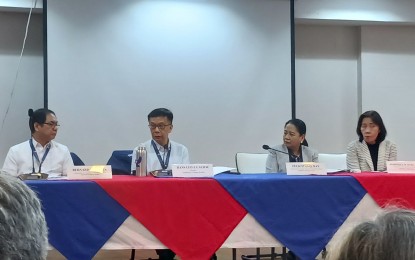
RUNAWAY. Migrant Workers Secretary Hans Leo Cacdac (2nd from left) leads a press briefing on Monday (Oct. 7, 2024). He said the two overseas Filipino workers under the Philippines-South Korea pilot caregiving program who did not return to work on Sept. 18 after the Chuseok Festival were arrested in Busan on Oct. 4. (PNA photo by Marita Moaje)
MANILA – The two overseas Filipino workers (OFWs) who were deployed to South Korea as caregivers under the Pilot Foreign Caregiver government-to-government hiring program, but failed to return to work after a holiday break, have been arrested.
Department of Migrant Workers (DMW) Secretary Hans Leo Cacdac said in a press briefing on Monday that they are waiting for the result of the investigation.
“Last October 4, they were found by the Special Investigation Team of Korean Immigration and they were arrested in Busan and are now being investigated,” Cacdac said.
The caregivers were among the 100 deployed to South Korea in August under the Employment Permit System pilot project that provides caregiving assistance to Korean households with young children, expectant mothers, single parents or working couples.
Cacdac said the first batch arrived in South Korea on Aug. 6.
They had a three-week specialized training and orientation seminar upon arrival, which ended on the first week of September.
The two caregivers left their quarters on Sept. 15, the second day of the five-day Chuseok (Korean Thanksgiving) holiday, but did not return to work on Sept. 18 and went off the grid.
Cacdac assured the two OFWs are still being assisted by the Philippine government.
“We are providing legal assistance to them to secure the best possible defense for them and make sure that they are not under duress or under any form of pressure in the course of the investigation, that they are adequately advised by legal counsel during the investigation,” he said.
“But at the same time, we are also advising them and others to be responsible in terms of their obligations as OFWs to finish their contracts kung hindi naman sila inaabuso (if they are not being abused), and not to violate the host country's immigration laws,” he added.
Despite the incident, Cacdac remains confident of the good relationship with the Korean government and its Ministry of Labor.
He said they are closely monitoring and assessing the implementation of the pilot program and that they will make corresponding adjustments in accordance with the challenges in the course of employment.
In a recent conversation with a Korean official, Cacdac said they both agreed that the incident was an isolated case and would not affect the overall program.
“That's the beauty of the longstanding bilateral labor relationship between Korea and the Philippines. So we are so equipped to address these issues and concerns as we have for the last 20 years of the employment permit system,” he said.
"We will make the corresponding adjustments to perhaps better inform our workers prior to departure about the implications of skirting or violating Korean immigration laws. And also to make sure that they are adequately prepared prior to departure. So again, the point of a pilot program is to expect challenges such as this." (PNA)
